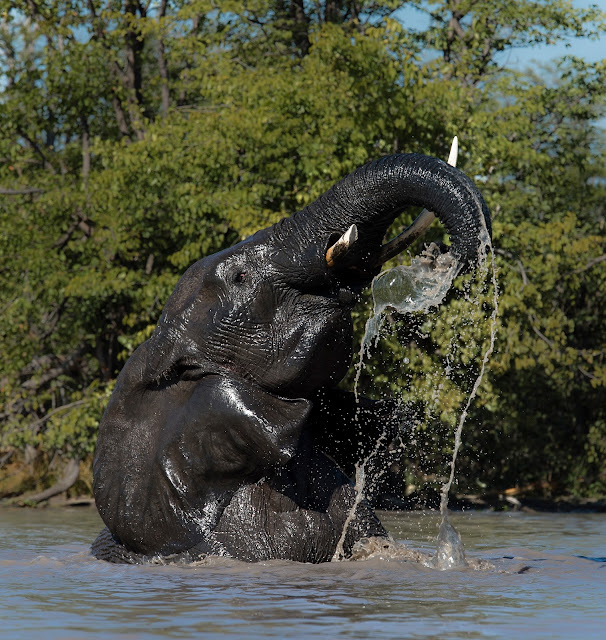Natural Selection Botswana
A NEW RANGER EXPERIENCE IN KHWAI PRIVATE RESERVE (KPR) IS A GREAT OPPORTUNITY TO MAKE AN EARLY START IN THE DAY TO TRACK PREDATORS.
Rangers are the unsung heroes of the conservation world. The KPR rangers are at the frontline of protecting the pristine wilderness and the 200,000-hectare concession that is Khwai Private Reserve. Aside from collecting data on wildlife and identifying potential threats to biodiversity and species, they also work closely with the KPR community in conserving this area and the natural resources found here.
Guests can spend a morning with the rangers where the major focus of this special experience is tracking and following predators on the concession. You’ll be first out early in the morning, before dawn, to have clear tracks before they are disturbed. You can either help or simply observe the rangers identifying individual predators and logging sightings. This important work assists in building a complete profile and history of a pride, pack or individual animal.
You’ll spend 4-6 hours on tracking wildlife, capturing data, patrolling the area as well as checking on conservation projects en-route if time allows. A packed breakfast will be enjoyed along the way, and this ideal opportunity to brush up on all things conservation with the rangers who are experts in their field. You'll then get back to camp just before lunch time. This activity can be done from Sable Alley, Tuludi and Little Sable. The ranger leading the experience will have a professional drivers permit and guiding license.
But best of all, proceeds from this experience go back into the conservation efforts in Khwai Private Reserve. This will help to equip the ranger team with their surveillance and anti-poaching efforts on the concession, as well as aid with further research needed in the various fields helping to manage and conserve the wildlife in the best way possible.
PREDATOR PATROL & RANGER EXPERIENCE
The focus of this special predator identification experience is tracking and following predators on the concession.
Make an early start in the day to track predators with the KPR rangers who are at the frontline of protecting the pristine wilderness and the 200,000-hectare concession that is Khwai Private Reserve. Aside from collecting data on wildlife and identifying potential threats to biodiversity and species, they also work closely with the KPR community in conserving this area and the natural resources found here.
This engaging experience will get you heading out with the rangers before dawn to track fresh spoor. You can either help or simply observe the rangers as they identify and capture data, logging each of the sighting. This important work assists in building a complete profile and history of a pride, pack or individual animal.
You’ll spend 4-6 hours doing this, as well as patrolling the area and checking on conservation projects en- route if time allows. A packed breakfast will be enjoyed along the way, an ideal opportunity to brush up on all things conservation with the rangers who are experts in their field.
Heading back to camp just before lunch, we hope you’ll arrive feeling inspired by the whole experience of getting in on the early morning predator action and leaving this beautiful reserve better equipped in understanding the critical role these wildlife rangers play and their important part in the larger KPR conservation story.
WHAT YOU CAN EXPECT
• After an earlier-than-normal morning wake-up call (and a piping hot coffee or tea), the rangers
will pick you up in camp. You’ll be heading out earlier than anyone else.
• Your ranger leading the experience will have a professional drivers permit and guiding license.
• This activity can be done from Sable Alley, Tuludi and Little Sable.
• You will spend the morning with the rangers tracking, patrolling, identifying and capturing data,
as well as visiting the various conservation projects on the concession.
• You will enjoy a packed breakfast out in the bush whilst out with the rangers.
• You’ll arrive back at camp just before lunch, at around 12h00.
• The whole experience will take between 4 and 6 hours.
• Your vehicle will be equipped with binoculars, one big camera and a tablet to collect data.
• You’ll be on the only vehicle with a tracker seat for optimal tracking by a professional tracker.
• There will be four bucket seats for guests, your vehicle will have no roof for optimal viewing
and scouting.
• Hot water bottles, blankets and ponchos are available for the cold mornings.
• In summer rain ponchos will be provided. Guests are advised to bring a hat and sunscreen to
protect themselves from the sun.
• There is a secure box between the seats to store away your valuables whilst out in the field.
• This activity is at an additional cost and proceeds from this experience go back into the
conservation efforts in Khwai Private Reserve.
• Children 6 years and older are welcome.
• This activity is available all year round.
• Minimum of 1 and maximum of 4 people allowed to enjoy this experience.
HOW THIS EXPERIENCE HELPS TO MAKE A DIFFERENCE
Rangers are the unsung heroes of the conservation world.
You will not only spend a morning tracking predators getting a understanding of the conservation work the KPR rangers do, but proceeds from this experience will go back into the conservation efforts on the concession.
This will help to equip the ranger team with their surveillance and anti-poaching efforts on the concession, as well as aid with further research needed in the various fields helping to manage and conserve the wildlife in the best way possible.
Aerial photo/video service/inquiries: info@traveltonamibia.com
















































